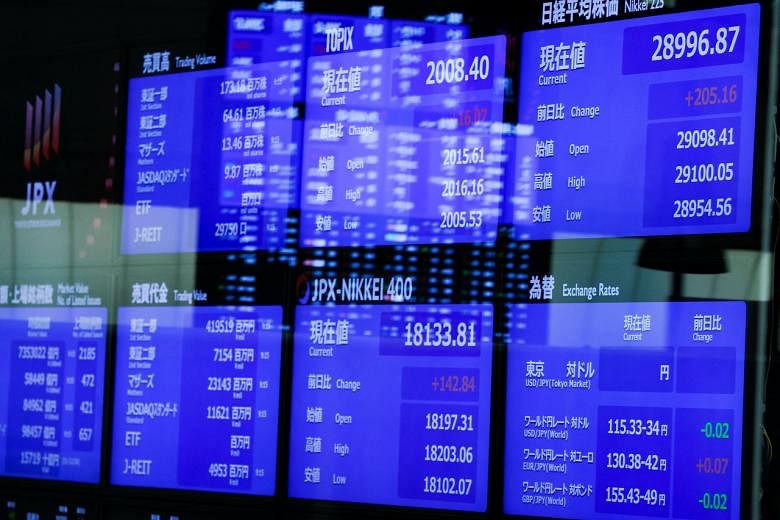SYDNEY (BLOOMBERG) - A global sell-off in technology shares continued into Asia on Thursday (Jan 6), following overnight losses on Wall Street as concerns grew about more aggressive monetary tightening by the Federal Reserve.
The MSCI AC Asia Pacific Communication Services Index dropped as much as 1.5 per cent to its lowest since June 2020. Hong Kong’s Hang Seng Tech Index fell 1.1 per cent in volatile trading, set for a fourth day of losses.
The sell-off came after Fed officials said at a key meeting last month that a strengthening economy and higher inflation could lead to earlier and faster interest rate increases than expected. Asian tech firms have also been grappling with the fallout of China's sweeping regulatory crackdown to curtail monopolistic behaviour in the sector.
Among the region’s top losers, South Korea’s gaming company Kakao Games and Australia’s payment services firm Afterpay dropped a maximum of about 11 per cent each. Tokyo-based SoftBank Group fell as much as 2.2 per cent.
Live-streaming platform operator Bilibili and short-video firm Kuaishou Technology, both backed by Tencent Holdings, were among the biggest casualties in Hong Kong amid continued worries over the Chinese tech giant’s recent moves to pare investment in the sector.
The sell-off in growth stocks may be more prominent in the United States given their much higher valuations, said Jun Rong Yeap, market strategist at IG Asia. “Hong Kong-listed tech firms, on the other hand, have already seen valuations beaten down so the downside risks from this aspect may seem limited.”
In addition to the less severe losses among Chinese tech firms versus their US peers, chipmakers in the region also demonstrated some degree of resilience. Samsung Electronics and SK Hynix both edged up after losing more than 1 per cent earlier.
In Japan, the Nikkei 225 index fell 2.1 per cent, while Australia’s S&P/ASX 200 Index slumped 1.8 per cent and South Korea’s Kospi index lost 0.4 per cent.
Hong Kong’s Hang Seng Index was down 0.8 per cent, while the Shanghai Composite Index dropped 0.7 per cent.
Bucking the trend, Singapore’s Straits Times Index was up 0.5 per cent at 11.05am.
US futures were slightly higher after the Nasdaq 100 tumbled 3.3 per cent, the most since March as rising Treasury yields added to concerns over growth and profitability. The S&P 500 retreated 1.9 per cent as traders increased bets that US rates would increase at least three times this year.
The yield on the US 10-year note pared some of its gains. It climbed to 1.71 per cent, a level not seen since April. Overnight swap markets moved to price in an 80 per cent chance of a 25 basis-point hike at the Fed's meeting in March. The US dollar was little changed.
Investors are focusing on tightening monetary policy as concerns persist about the Omicron variant's threat to global growth and company earnings. Fed officials said a strengthening economy and higher inflation could lead to earlier and faster rate increases than expected, with some also favouring moves to shrink the balance sheet soon after.
"We are prepping people for volatility," Ms Carol Schleif, BMO Family Office's deputy chief investment officer said on Bloomberg Television. "You had another record double-digit year and yet investors' mood is pretty dour. We definitely think the readjustment of the volatility will increase this year because there is a lot to be dealt with. You do have a leveling off of some things, improvement in some things and people are going to be watching both the Fed and company earnings."
Meanwhile, restrictions are coming back in some places in the face of Omicron. Hong Kong reimposed social curbs and halted flights from eight countries, and US school closings are accelerating as case counts soar.
Elsewhere, Bitcoin tumbled to below US$43,000, the lowest since its early-December weekend flash crash. Other cryptocurrencies also declined. Oil fell for the first time in four days. The Korean won slipped to the lowest since July 2020.

